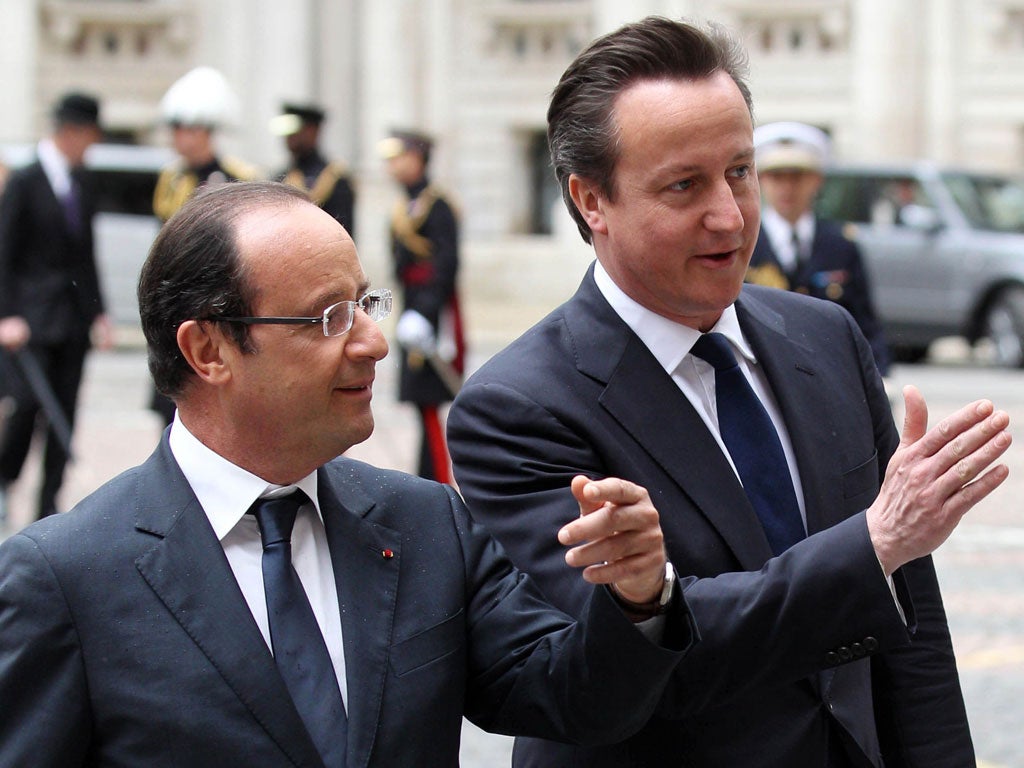Adrian Hamilton: A multi-speed Europe, yes. But we're on a road to nowhere
World View: To hope that the eurozone will now fall apart is just wishful thinking

Anyone under the illusion that David Cameron's sudden enthusiasm for an EU referendum was just another example of British prevarication on the issue should listen to William Hague's announcement yesterday. Just as every department of state was ordered last year to draw up cuts, so every department is now being instructed to look at every aspect of European legislation to see where it overlaps with British law.
Strictly speaking, such an audit was part of the Coalition agreement. In formal terms, the review and the suggestion of a referendum are things for the next parliament, not this. But you don't up the ante in this way without setting off on a road from which you cannot return.
The blunt truth which our allies in Europe and the public at home must now accept is that the Government is embarked on a course of radical renegotiation. And the unnerving thing is that it doesn't seem to care very much whether a renegotiation works or whether it ends with Britain leaving the Union altogether.
The Prime Minister hasn't just opened up the issues of a referendum and an audit for fear of his backbenchers. He seems genuinely to think that circumstances favour a realignment in which Britain could force entirely new terms of membership.
He is not entirely wrong. The eurozone crisis is clearly propelling its members towards a closer integration, leaving the UK on the sidelines. Britain could claim that this changes the ground rules in a way that justifies a different sort of engagement. No 10 even seems to have taken some comfort from the relatively affable meeting between François Hollande and Cameron on Tuesday when, on Cameron's reading, the French President accepted the logic of a multi-speed Europe. Again, there is some truth in this. The French government, which includes a foreign minister who opposed the Lisbon treaty, is opposed to any radical increase in the powers of the Commission.
It's a complete misreading of the situation, however, to think France or any other country would support Britain in a dismantling of Brussels' powers. We would win allies if we joined the fray in finding a path out of the eurozone crisis. But so long as we remain as just an observer, we will be excluded from the steps that the eurozone must take to muddle through the crisis. To hope that the eurozone will now fall apart is just wishful thinking. It will get by in one form or another because it is in the interests of all its members (and Britain's) that it does. Even on the practical level, it will be impossible for the UK to remain as a semi-detached member of the EU. Any moves to banking and fiscal integration will involve supervision by the EU Commission. Do British representatives then absent themselves every time these matters are discussed? Where do UK MEPs stand when it comes to democratic scrutiny of the institutions involved?
If there is a referendum and the English decide against EU membership and Scotland votes overwhelmingly in favour, where does that leave the UK's future? The very best outcome for London would be that the rest of Europe accepted us as a trading partner only. The worst would be that we took ourselves out of the exit door and had to negotiate any trade and commercial terms from scratch.
Made in Japan: a tale of two countries
The House of Commons may have got itself into a lather over investigating the Libor scandal, but for a truly penetrating parliamentary report look at the findings of The Fukushima Nuclear Independent Investigation Commission established by a Diet panel. It is a devastating indictment not just of the corporate and regulatory controls on nuclear power, but blames a whole national culture for the disaster.
"Made in Japan" is the blunt summary of the panel, whose report last week has received far too little notice here (it contradicts the complacent report by the UK's chief nuclear inspector that this was basically a "natural disaster", for a start).
But if "Made in Japan" can be ascribed to the worst lessons of this disaster, so it can apply to the best. The show this week at Asia House in London of products from the Tohoku area devastated by the tsunami, including local crafts and new designs, is a tribute to both the Japanese sense of national identity and the profound commitment they make to local crafts and place. Anyone interested not just in helping Tohoku but also in the culture that makes the country so resilient should go before it closes on Sunday.
Join our commenting forum
Join thought-provoking conversations, follow other Independent readers and see their replies
Comments
Bookmark popover
Removed from bookmarks